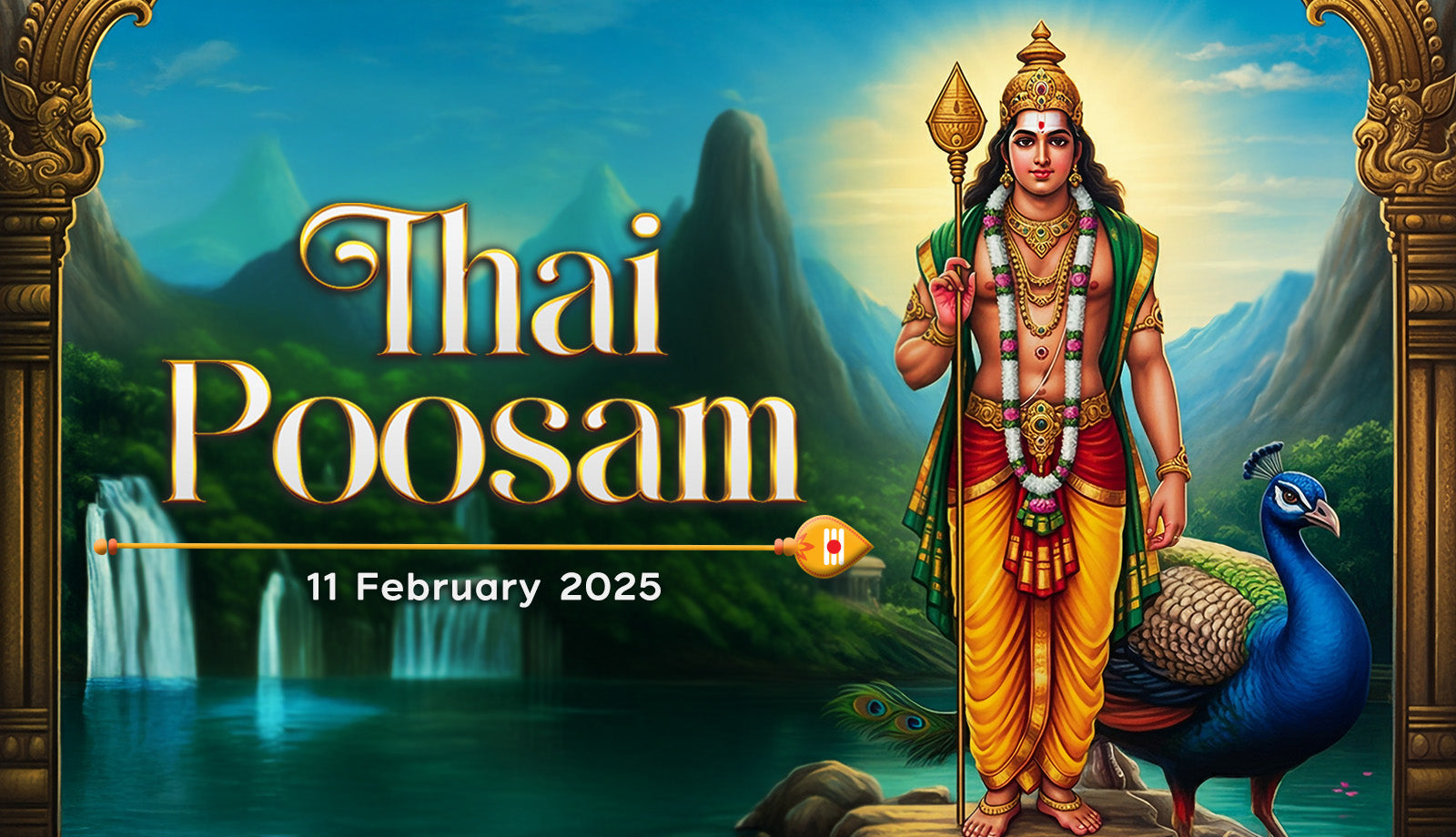
Thaipusam 2025 : A Festival of Devotion and Sacrifice
Thaipusam is an important Hindu festival of the Tamil people, especially of India, Malaysia, Singapore, Sri Lanka and other nations around the world. It is Lord Murugan's festival, who is Lord Shiva & Goddess Parvati's son. Devotees celebrate Thaipoosam with deep faith, fasting and unique rituals as a way of expressing gratitude and seeking blessings.
The Meaning and Significance of Thaipusam
Thaipusam is observed on the full moon day in the Tamil month of Thai, which falls in January or February. The word Thaipusam is a combination of two words: Thai, which is the month, and Pusam, the name of the star. The star Pusam is now at its highest point and is a good time to pray to Lord Murugan.
Lord Murugan is the god of war, wisdom as well as victory. According to Hindu mythology, Goddess Parvati gave Lord Murugan a divine spear (Vel) on this day to defeat the demon Soorapadman. Thaipusam is celebrated to honor this event and to show devotion to Lord Murugan.
How Thaipusam is Celebrated
Thaipusam is a festival of devotion and self sacrifice. The devotees undergo various practices to show their love & gratitude towards Lord Murugan.
1. Fasting and Preparation
The majority of devotees prepare for Thaipusam weeks before the day. They practice strict fasting, eat only vegetarian food, and observe prayers and meditation. This spiritual practice allows them to purify their body and mind.
2. Carrying the Kavadi
One of the most well-known rituals of Thaipusam is carrying "Kavadi." It is a decorated wooden or a metal structure that devotees carry it on their shoulder. It symbolizes a burden carried in devotion. Some devotees pierce their skin or tongue or the cheeks with small hooks as a way of showing their faith as well as overcoming the pain with prayer.
3. Milk Offerings (Paal Kudam)
Many devotees carry pots of milk (Paal Kudam) as an offering to Lord Murugan. This symbolizes purity and devotion. The milk is poured on the idol of Lord Murugan at the temple as a sacred offering.
4. Procession and Chants
Devotees walk barefoot to the temples carrying Kavadi or milk pots. This journey can be several kilometers long and they chant prayers and sing hymns in praise of Lord Murugan. Some devotees walk in a trance-like state believed to be a sign of divine blessing.
5. Piercing as well as Body Modifications
Some extreme devotees pierce their bodies with hooks, spears or needles. This act is done with full faith as devotees believe that Lord Murugan gives them strength to endure pain without suffering. The ritual represents self sacrifice and devotion as well as overcoming physical limits through divine support.
Major Thaipusam Celebrations Around the World
Thaipusam is celebrated in many countries where Tamil communities live. Some of the most famous celebrations take place in:
India
Thaipusam is observed in most of the Lord Murugan temples in TamilNadu, particularly at Palani, Tiruchendur, Thirupparankundram. Pilgrims make long pilgrimages and perform sacred rituals in these temples.
Malaysia
The largest Thaipusam is observed at the Batu Caves outside Kuala Lumpur. Thousands of pilgrims walk barefoot for miles to the cave temple. The festival draws millions of people, including tourists to see devotion & rituals.
Singapore
In Singapore, Thaipusam is a large festival with huge processions between the Sri Srinivasa Perumal Temple and the Sri Thendayuthapani Temple. Pilgrims carry Kavadis, milk pots while reciting prayers as well as hymns.
Sri Lanka
Sri Lanka has a large Tamil Hindu population that celebrates Thaipusam with grand temple processions and rituals at places like Nallur Kandaswamy Temple in Jaffna.
Other Countries
Thaipusam is celebrated in Indonesia, Thailand, Mauritius, South Africa & other places where Tamil communities live. Celebrations may vary less but devotion and rituals remain the same.
The Spiritual Meaning of Thaipusam
Thaipusam is not just about physical rituals, it has deep spiritual significance. It teaches important lessons such as:
Faith and Devotion: Devotees show their deep love and surrender to Lord Murugan through fasting, prayers, and Kavadi.
Overcoming Obstacles: Just like Lord Murugan defeated Soorapadman, devotees believe they can overcome difficulties in life with faith and dedication.
Self-Sacrifice and Discipline: The festival teaches self-control, humility, and the power of devotion.
Purification of Mind and Body: Through fasting and prayers, devotees cleanse themselves and focus on their spiritual journey.
Conclusion
Thaipusam is a celebration of great faith, devotion, and sacrifice. It unites people in a dramatic spectacle of spiritual strength and solidarity. As a devotee or as a spectator, Thaipusam is a celebration that inspires you with commitment, inner strength, and the victory of good over evil.
If you ever have an opportunity to see Thaipusam, you will be seeing a snapshot of color, devotion, and exhilarating acts of faith. It reminds us that with a strong conviction of faith in the mind, anything is possible for life.
May Lord Murugan bless all Thaipusam celebrants with good health, happiness and prosperity!
